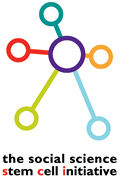Stem Cells: From Tissue Engineering and Regenerative Medicine to Policy. A Report.
On the 19th and 20th of April 2006, nearly 200 scientists and members of industry met at the East of England Stem Cell Network International Symposium.
Increasing expectations of the benefit of stem cells to human health, particularly with regard to degenerative diseases and repair of damaged tissue and bone, have been fuelled by recent advances in stem cell biology.
However, the mammoth task lies ahead in translating the basic research into viable medical technologies requires innovation, not only for those carrying out the basic science but also for those involved with clinical medicine, tissue engineering, bioprocessing and drug development. In addition, a range of regulatory, legal and policy issues must also be addressed to ensure that stem cell medicine develops within an appropriate framework that maintains public confidence.
This symposium which was co-organised by members of the EESCN including Professor Brian Salter, currently funded by the ESRC's SCI Programme, was structured in such a way that the contribution from the social science community were centrally located within the programme schedule. This symbolic positioning of social science work emphasised the need for the wider bioscience community to engage with the critical insights such work provides, especially in regard to questions about ‘translation' and governance of research. The first session began with an update on the basic science and its interface with bioengineering in the first session. Presentations covered the issues of pluripotency, isolation and culture, disease modelling and differentiation. There are a number of common problems shared by the bioscience community in taking the field forward, including why cells can be so unstable, or differentiate in different ways, the problem of their plasticity and teratogenic effect, the standardising of biological markers and use of growth media, and so on.
Session two tackled the issues of governance from a UK , European and global perspective. Perspectives were taken from a bioethical, sociological and economic point of view with speakers giving contrasting evidence in order to map the past, present and future concerns for stem cell science. Some key points were made during the papers and discussion including:
-
Linda Hogle's important observation that depending on the tissue system involved, the clinical application of somatic or hESCs intersects with ethical regimes in distinct clinical fields – such as with the ethics of experimental surgery (as found for example in neurosurgery), indicating the need to avoid seeing ethics/technology clusters in isolation from each other
-
Paul Martin's clarification of the distinct business models that firms use in the field and which of these are more, or less, likely to be successful
-
Suzi Leather's (HFEA) discussion on the draft Bill entering Parliament later this year which will need to clarify government position with respect to chimera, and the question ‘how much human DNA makes us human'?
-
Cathy Waldy's detailed and disturbing account of exploitative tissue markets in the US , pointing out that there are no federal regulatory barriers to prevent the reproductive market in oocytes becoming a market for research oocytes as well
-
David Coles (ex EC) discussed the ways in which hESC research may or may not be supported in the forthcoming FP7 programme, and the possible effect of a blocking minority of a number of countries
The final session covered translational research and gave the greatest insight to the challenges that lie ahead. The current gap between benchtop and the clinic was explored including the need for developments in materials science, bioprocessing and intellectual property. It also needed input from the social science community especially in respect to understanding innovation dynamics. On a more positive note, the future benefits of stem cell therapies were described for neuroscience, cardiac repair and tissue repair.
